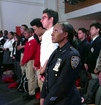

Catholic high school students across the archdiocese are asked to pray “for a more just world,” to learn about “peoples of different races and languages and cultures,” to act “to challenge the bullying and the stereotyping that goes on either in the lunchroom or in the hallway or online” and to welcome those who are unlike them.
So suggested the keynote speaker of “Diverse America: A Catholic Lens,” held March 10 at the Sheen Center for Thought and Culture in Lower Manhattan.
The forum, subtitled “A Conversation on Race and Diversity Through the Lens of Catholic Social Teaching,” was sponsored by the archdiocese. It was billed as an event “to engage Catholic high school students in thoughtful conversation about the importance of diversity—particularly in light of the current national dialogue—and prepare them to be leaders of understanding and inclusion in their communities.”
Some 240 student representatives, from nearly 20 Catholic high schools, heard different perspectives on race relations, police-community affairs and immigration from noted experts and leaders in those fields.
The keynote speaker was Father Bryan Massingale, a member of the theology department at Fordham University who is a Catholic social ethicist and scholar of African-American theological ethics, racial justice and liberation theology, and author of “Racial Justice and the Catholic Church.”
“By God’s will,” Father Massingale said, “who we are as Church” are people “of every race, language and way of life.”
“But the problem is this: that while we are more diverse than ever before in our nation, we have profound tensions because our diversity raises new questions about who or what counts as American…
“All too often, we hang out with people who look like and talk like and think like us. Isolation,” he said, “breeds ignorance, indifference and fear.”
Faith, not politics, was the purpose of the program, Father Massingale said. “You’re here,” he told the students, “because we need you to be models, catalysts, exemplars and examples of Christian leadership in a diverse nation and in a diverse Church.”
His words were received with sustained applause.
The panelists included Father Massingale; Assistant Chief Edward Delatorre of the NYPD and Borough Commander for Staten Island; Laura Garcia, racial justice program coordinator for YWCA Orange County; and Father Joseph Espaillat, pastor of St. Anthony of Padua parish in the Bronx, director of the Hispanic Catholic Charismatic Center in the Bronx and spiritual director of the archdiocesan Office of Youth Ministry.
Also on the panel were two of the archdiocese’s Pierre Toussaint scholars, a scholarship program administered through the archdiocesan Office of Black Ministry: Mark Akhimien of Sacred Heart parish in the Bronx, a sophomore at the University of Miami who is majoring in business technology and marketing, and who is employed as a marketing coordinator; and Kayode Ezike of Holy Name parish in New Rochelle, a senior at MIT majoring in electrical engineering and computer science.
The panel moderator was Dr. Lily D. McNair, provost and senior vice president for academic affairs at Wagner College.
Brother Tyrone Davis, C.F.C., executive director of the Office of Black Ministry and the Pierre Tousissant Scholarship Program for college student leaders, delivered the opening prayer. Father Espaillat offered the closing prayer.
The question-and-answer period enabled the students to engage the speakers and examine the topics through the lens of Catholic social teaching, as the name of the gathering implied.
Matt Ciaccio, a senior at Msgr. Farrell High School on Staten Island, asked the panelists if talking about diversity and problems was more divisive than helpful. “We are one race, we are the human race,” he said. “All beings have a soul. We are all beings of the same origin and we are all beings of the same destination. We as Christians must continue to accept each other.”
Dr. Timothy McNiff, superintendent of schools for the archdiocese, in an interview before the assembly began, said he hoped the students would witness firsthand how to keep civility as part of a conversation during dialogue and delve deeper into the Catholic Church’s teachings on the topics.
Delivering the symposium’s closing remarks, Dr. McNiff praised the student participants, whom he called “ambassadors for Catholic education” before assigning them “homework.”
“This conversation is not to stop here,” he said, instructing them to bring the lessons learned back to their schools.
From each one of the schools, two student leaders have been chosen to work in tandem with the others. “You step up,” Dr. McNiff told them. “You take the leadership role to get this done so that your school can benefit from it.”
As a thank you, the two student leaders from each of the schools will be bused to Washington, D.C. in late April to receive a private tour of the Smithsonian National Museum of African American History & Culture, and visit the Supreme Court, on which serves a 1972 alumna of Cardinal Spellman High School in the Bronx, Justice Sonia Sotomayor.